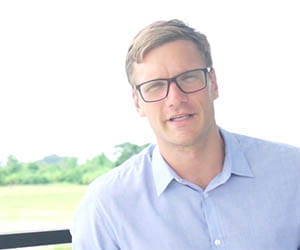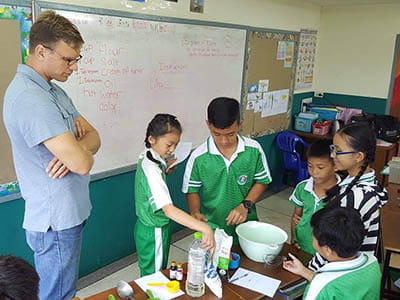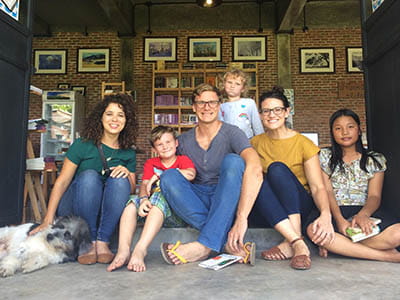
Caleb Lorensen, 2017 Master of Science in Education (MSEd) graduate and 2017 Scholar of Change, is working his dream job in Thailand. Finding it has been a journey full of exploration and introspection.
“While earning my undergraduate degree in education, I really had a desire to do more with international education development,” says Lorensen, who often traveled far from his home in Omaha, Nebraska, to learn more about education outside the U.S. “I met a guy who worked for a nongovernmental organization (NGO) in India who strongly recommended I move to Thailand to start my career in development. The following year, my wife and I packed everything we’d need to live on the other side of the world so we could work at a school that was created to serve at-risk youth in northern Thailand.”
After 3 years working at the school, Lorensen found further opportunity at a major university in Chiang Mai, Thailand, where he could have more flexibility to earn a living and have the time to carry out ad hoc projects with nonprofit schools in desperate need of curriculum and program development. It was a colleague in Chiang Mai who inspired Lorensen to pursue his MSEd. “It was her last day before she left for a new job and she came to me and said ‘Caleb, you have to get your master’s in education so you can come and be the light that shines in the darkness in the Thai education system and bring the change that needs to occur,’” recalls Lorensen. “I thought that was a very powerful moment, and as I sat there stunned by the boldness of her statement, I wondered exactly how I could do that while continuing this important work.”

In addition, Lorensen says the way Walden courses taught rubrics has made a world of difference. “There’s something about the process of rubric design and assessment for learning in my Walden program that connected with me that previously didn’t in my undergrad program. It’s important because rubrics are used to help guide instruction, learning, and assessment but are nowhere to be found at the university level in Thailand.” Along with a colleague, he had been working tirelessly to get professors to understand the value of rubrics and actually use them. “An old professor who spent her entire career at the university level came to me and said ‘I wish someone had taught me this a long time ago.’ Another, after I worked with her for 2 years, said, ‘I finally understand what you’ve been trying to do.’”
The teacher training programs in Thailand’s education system are seemingly stuck in time, Lorensen says. “The government-run schools are in desperate shape but the private schools are good, they’re just not accessible to low-income families,” says Lorensen. “There are Thai staff who are experimenting to find what works and what doesn’t work, but they still need pedagogy teacher trainings. Schools here need to invest more in their teachers.”
 Now, Lorensen gets that chance as he joins the International Sustainable Development Studies Institute as a coach and curriculum development consultant. “I get to improve academic instruction within the classroom by collaborating with Thai staff.” Through the organization’s NGO component, Lorensen can continue his community-level development work with rural schools.
Now, Lorensen gets that chance as he joins the International Sustainable Development Studies Institute as a coach and curriculum development consultant. “I get to improve academic instruction within the classroom by collaborating with Thai staff.” Through the organization’s NGO component, Lorensen can continue his community-level development work with rural schools.“It’s important my actions match what I communicate about who I am,” he says. “If I can teach a class of students, I’d be happy. But if I can train and invest in teachers, then I can touch thousands of kids’ lives over the course of years. If I can help one teacher be a little bit better, that effort goes a long way.”
—Jen Raider



